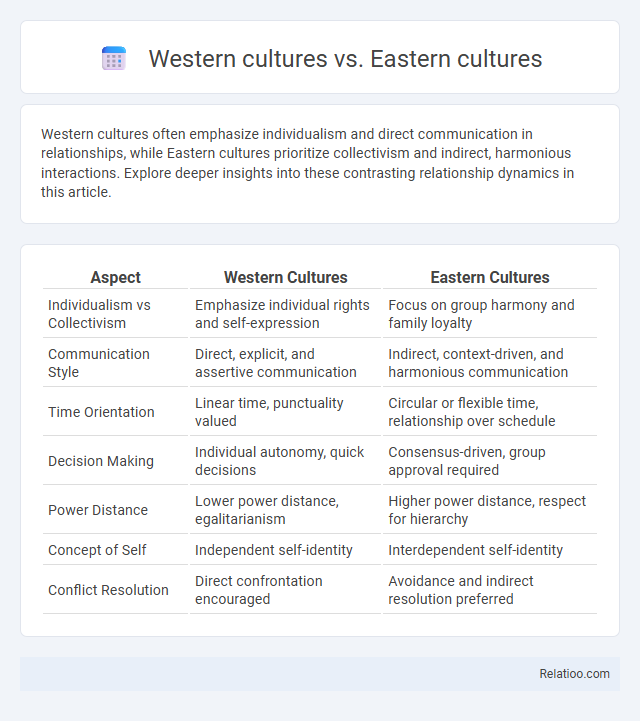Western cultures often emphasize individualism and direct communication in relationships, while Eastern cultures prioritize collectivism and indirect, harmonious interactions. Explore deeper insights into these contrasting relationship dynamics in this article.
Table of Comparison
| Aspect | Western Cultures | Eastern Cultures |
|---|---|---|
| Individualism vs Collectivism | Emphasize individual rights and self-expression | Focus on group harmony and family loyalty |
| Communication Style | Direct, explicit, and assertive communication | Indirect, context-driven, and harmonious communication |
| Time Orientation | Linear time, punctuality valued | Circular or flexible time, relationship over schedule |
| Decision Making | Individual autonomy, quick decisions | Consensus-driven, group approval required |
| Power Distance | Lower power distance, egalitarianism | Higher power distance, respect for hierarchy |
| Concept of Self | Independent self-identity | Interdependent self-identity |
| Conflict Resolution | Direct confrontation encouraged | Avoidance and indirect resolution preferred |
Historical Origins of Western and Eastern Cultures
Western cultures trace their historical origins to ancient Greece and Rome, emphasizing individualism, codified laws, and philosophical inquiry, which shaped modern concepts of justice and personal responsibility. Eastern cultures, rooted in Confucianism, Taoism, and Buddhism from ancient China and India, prioritize community harmony, social hierarchy, and collective well-being. These foundational beliefs influence distinct apology rituals: Western cultures often focus on explicit verbal acknowledgment and personal accountability, while Eastern cultures emphasize restoring social balance through indirect expressions and acts of humility.
Philosophical Foundations: Individualism vs Collectivism
Western cultures prioritize individualism, emphasizing personal responsibility, autonomy, and self-expression in apology rituals, where the offender explicitly acknowledges fault and seeks personal redemption. Eastern cultures, grounded in collectivism, focus on restoring group harmony and social balance, often using indirect or formal apology rituals that demonstrate respect and repentance without necessarily admitting personal guilt. These contrasting philosophical foundations shape how apologies function as social tools, reflecting deep-rooted values about the self and community.
Family Structures and Social Hierarchies
Western cultures often emphasize nuclear family structures with relatively egalitarian social hierarchies, where apologies are typically direct and focused on individual accountability. Eastern cultures generally prioritize extended family networks and maintain hierarchical social orders, leading to apology rituals that emphasize respect, harmony, and sometimes indirect expressions of remorse. These differences in family structures and social hierarchies significantly shape the style and meaning of apology rituals within each cultural context.
Education Systems and Approaches to Learning
Western cultures emphasize critical thinking and individualism in education systems, fostering creativity and independent problem-solving skills. Eastern cultures prioritize respect, discipline, and memorization, with a strong focus on collective harmony and teacher-student hierarchy influencing learning approaches. Understanding these distinct perspectives can help you navigate global education dynamics and enhance cross-cultural communication.
Communication Styles and Language Nuances
Western cultures emphasize direct communication and explicit verbal expressions in apology rituals, often using clear statements like "I apologize" or "I'm sorry" to convey remorse. Eastern cultures prioritize indirect communication and subtle language nuances, employing context, tone, and non-verbal cues such as bowing or silence to express regret and maintain social harmony. These divergent communication styles reflect deeper cultural values, with individualism driving straightforward apology in the West and collectivism fostering nuanced, relationally sensitive interactions in Eastern societies.
Religion, Spirituality, and Worldview
Western cultures, deeply influenced by Christianity and individualism, often approach apology rituals with explicit verbal admissions of fault emphasizing personal responsibility and forgiveness. Eastern cultures, shaped by Confucianism, Buddhism, and collectivist values, tend to express apologies through indirect communication, non-verbal gestures, and restoring social harmony rather than explicit statements. The role of religion and spirituality in these cultures frames worldview perspectives on guilt, honor, and reconciliation, where Western traditions prioritize moral accountability, and Eastern traditions emphasize relational balance and interconnectedness.
Concepts of Success and Personal Achievement
Western cultures often emphasize individual success and personal achievement as key indicators of self-worth, highlighting ambition and measurable accomplishments. Eastern cultures typically prioritize collective harmony and social roles, viewing success through the lens of fulfilling family or community expectations rather than solely personal milestones. Your understanding of apology rituals can vary significantly between these cultures, with Western approaches focusing on personal responsibility and restoration, while Eastern practices emphasize social harmony and indirect expressions of remorse.
Attitudes Toward Authority and Governance
Western cultures often emphasize individualism and question authority, promoting democratic governance and open dialogue, while Eastern cultures typically prioritize collectivism and respect for hierarchical authority, valuing harmony and social order. The apology ritual in Western contexts usually involves direct acknowledgment of mistakes to restore personal integrity, whereas in Eastern settings, it often serves to maintain group harmony and demonstrate humility toward authority figures. Your understanding of these differing attitudes can improve cross-cultural communication and governance interactions.
Art, Literature, and Aesthetic Values
Western cultures often emphasize individual expression and narrative complexity in art and literature, valuing bold aesthetics and personal creativity as reflections of identity. Eastern cultures prioritize harmony, subtlety, and symbolism in their artistic and literary traditions, where apology rituals intertwine with aesthetics to convey respect and social balance through refined gestures or poetic forms. Understanding these cultural distinctions can enhance your appreciation of diverse aesthetic values and the nuanced role of apology in artistic expression.
Work Ethic and Approaches to Time Management
Western cultures emphasize individual work ethic, prioritizing efficiency and punctuality to meet deadlines, often valuing direct communication in time management. Eastern cultures focus on collective responsibility and harmony, with flexible time perceptions allowing for relationship-building and context-driven task completion. Apology rituals in Eastern workplaces often involve humility and restoring group harmony, whereas Western practices tend to highlight accountability and swift resolution.

Infographic: Western cultures vs Eastern cultures
 relatioo.com
relatioo.com